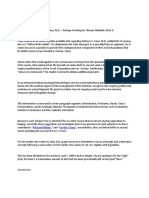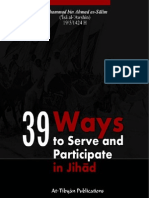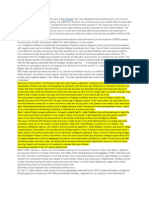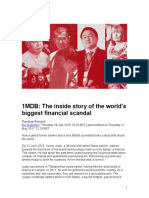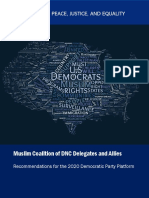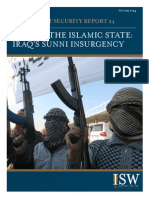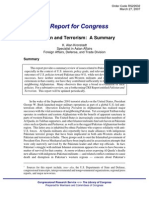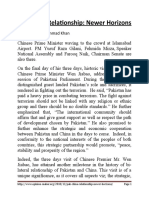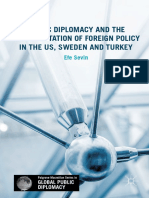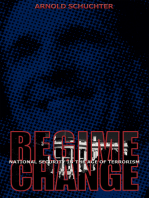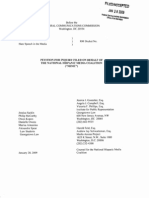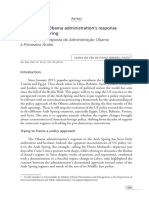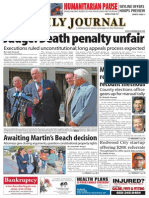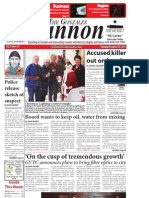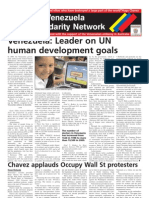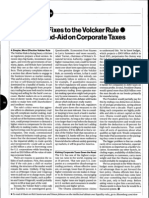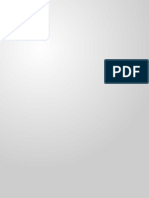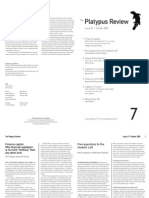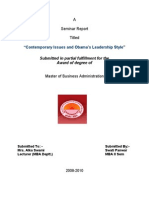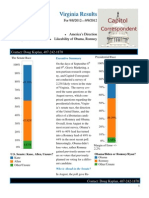Open Letter To Pres Obama About Democracy
Open Letter To Pres Obama About Democracy
Uploaded by
محمود أبو مأمونCopyright:
Available Formats
Open Letter To Pres Obama About Democracy
Open Letter To Pres Obama About Democracy
Uploaded by
محمود أبو مأمونOriginal Title
Copyright
Available Formats
Share this document
Did you find this document useful?
Is this content inappropriate?
Copyright:
Available Formats
Open Letter To Pres Obama About Democracy
Open Letter To Pres Obama About Democracy
Uploaded by
محمود أبو مأمونCopyright:
Available Formats
Center for the Study of Islam and Democracy
URGENT & Open Letter May 22, 2009
President Barack Hussein Obama
The White House
1600 Pennsylvania Avenue, NW
Washington, DC 20500
Dear Mr. President:
First of all, congratulations on your victory in November. Like so many others throughout
the world, we find ourselves both hopeful and inspired. Your election is proof of
America’s continued promise as a land of opportunity, equality, and freedom. Your
presidency presents a historic opportunity to chart a new course in foreign affairs, and
particularly in the troubled relationship between the United States and the Muslim world.
We are heartened by your promise to listen to and understand the hopes and aspirations of
Arabs and Muslims. By shutting down Guantanamo Bay and forbidding torture, your
administration will inspire greater confidence between the United States and the Muslim
world. Last month, in your first major interview, millions of Arabs heard your call for
mutual respect on one of the Middle East’s most watched television channels. They were
encouraged to find that you hold a resolution to the Israel-Palestinian conflict as an
urgent priority, as evidenced by the appointment of Senator George Mitchell as your
envoy. Reaching out to the people of the region so early on in your presidency is a step of
no small significance. But it is a step that must be followed by concrete policy changes.
Improving relations between the United States and Middle Eastern nations is not simply a
matter of changing some policies here and there. For too long, U.S. policy toward the
Middle East has been fundamentally misguided. The United States, for half a century, has
frequently supported repressive regimes that routinely violate human rights, and that
torture and imprison those who dare criticize them and prevent their citizens from
participation in peaceful civic and political activities. U.S. support for Arab autocrats was
Open Letter to President Obama Page 1 of 55
supposed to serve U.S. national interests and regional stability. In reality, it produced a
region increasingly tormented by rampant corruption, extremism, and instability.
In his second inaugural address, President Bush pledged that the United States would no
longer support tyrants and would stand with those activists and reformers fighting for
democratic change. The Bush administration, however, quickly turned its back on Middle
East democracy after Islamist parties performed well in elections throughout the region.
This not only hurt the credibility of the United States, dismayed democrats and
emboldened extremists in the region, but also sent a powerful message to autocrats that
they could reassert their power and crush the opposition with impunity.
In order to rebuild relations of mutual respect, it is critical that the United States be on the
right side of history regarding the human, civil, and political rights of the peoples of the
Middle East. There is no doubt that the people of the Middle East long for greater
freedom and democracy; they have proven themselves willing to fight for it. What they
need from your administration is a commitment to encourage political reform not through
wars, threats, or imposition, but through peaceful policies that reward governments that
take active and measurable steps towards genuine democratic reforms. Moreover, the US
should not hesitate to speak out in condemnation when opposition activists are unjustly
imprisoned in Egypt, Jordan, Saudi Arabia, Tunisia, or elsewhere. When necessary, the
United States should use its considerable economic and diplomatic leverage to put
pressure on its allies in the region when they fail to meet basic standards of human rights.
We recognize that taking these steps will present both difficulties and dilemmas.
Accordingly, bold action is needed today more than ever. For too long, American policy
in the Middle East has been paralyzed by fear of Islamist parties coming to power. Some
of these fears are both legitimate and understandable; many Islamists advocate illiberal
policies. They need to do more to demonstrate their commitment to the rights of women
and religious minorities, and their willingness to tolerate dissent. However, most
mainstream Islamist groups in the region are nonviolent and respect the democratic
process.
In many countries, including Turkey, Indonesia, and Morocco, the right to participate in
reasonably credible and open elections has moderated Islamist parties and enhanced their
commitment to democratic norms. We may not agree with what they have to say, but if
we wish to both preach and practice democracy, it is simply impossible to exclude the
largest opposition groups in the region from the democratic process. At the same time,
to reduce the future of the region to a contest between Islamists and authoritarian regimes
would be a mistake. Promoting democratic openings in the region will give liberal and
secular parties a chance to establish themselves and communicate their ideas to the
populace after decades of repression which left them weak and marginalized. More
Open Letter to President Obama Page 2 of 55
competition between parties of diverse ideological backgrounds would be healthy for
political development in the region.
In short, we have an unprecedented opportunity to send a clear message to the Arab and
Muslim world: the United States will support all those who strive for freedom,
democracy, and human rights. You, Mr. President, have recently relayed such a message
in your inaugural address when you said: “To those who cling to power through
corruption and deceit and the silencing of dissent, know that you are on the wrong side
of history, but that we will extend a hand if you are willing to unclench your fist.”
We are fully aware that, with a worsening global economic crisis, and continuing
challenges in Iraq, Iran, Pakistan, and Afghanistan, political reform and progress toward
democratic reform in the Middle East will need to compete with a whole host of other
priorities on your agenda. Policy is often about making difficult choices. However, as you
work on other Middle East priorities, we urge you to elevate democratic reform and
respect for human rights as key considerations in your engagement with both Arab
regimes and Arab publics.
In conclusion, we are writing this letter to raise our profound belief that supporting
democrats and democracy in the Middle East is not only in the region’s interests, but in
the United States’ as well. Perhaps more importantly, what we choose to do with this
critical issue will reveal a great deal about the strength of American democratic ideals in
this new era – and whether or not we will decide to respect and apply them in the Middle
East.
Coordination Committee:
Radwan A. Masmoudi Shadi Hamid
Center for the Study of Islam & Project on Middle East Democracy
Democracy
Geneive Abdo Michele Dunne
The Century Foundation Carnegie Endowment for Int. Peace
Larry Diamond
Ctr. on Democracy, Dev. & Rule of Law, Jennifer Windsor
Stanford University Freedom House
Open Letter to President Obama Page 3 of 55
American Scholars, Experts & Organizations:
Tamara Cofman Wittes Jack DuVall
Saban Center, Brookings Institution Int. Center on Nonviolent Conflict
Francis Fukuyama Robert A. Pastor
The Johns Hopkins School of Advanced Center for Democracy and Election
International Studies Management, American University
Matt Yglesias Jean Bethke Elshtain
Center for American Progress University of Chicago
Mona Yacoubian Peter Beinart
U.S. Institute of Peace Council on Foreign Relations
John L. Esposito Bob Edgar
Georgetown University Common Cause
Reza Aslan Rachel Kleinfeld
UC Riverside Truman National Security Project
Morton H. Halperin Robert Kagan
Formerly Office of Policy Planning, Carnegie Endowment for Int. Peace
Department of State
Dokhi Fassihian
Will Marshall Democracy Coalition Project
Progressive Policy Institute
Dina Guirguis
Randa Slim Voices for a Democratic Egypt
Rockefeller Brothers Fund
Andrew Albertson
Neil Hicks Project on Middle East Democracy
Human Rights First
Nathan J. Brown
Robert R. LaGamma George Washington University
Council for a Community of Democracies
Open Letter to President Obama Page 4 of 55
Marc Gopin Asma Afsaruddin
Ctr for World Religions, Diplomacy, & University of Notre Dame
Conflict Resolution, GMU
Joe Stork
Graham E. Fuller Human Rights Watch
Simon Fraser University, Vancouver BC.
Will Dobson
Rabbi Michael Lerner Carnegie Endowment for Int. Peace
Network of Spiritual Progressives
Anisa Mehdi
Farid Senzai Arab-American Journalist
Institute for Social Policy and
Understanding Mohammed Ayoob
Michigan State University
Frank Kaufmann
Inter Religious Federation for World Peter Mandaville
Peace Center for Global Studies, GMU
Ammar Abdulhamid Omid Safi
Tharwa Foundation University of North Carolina
Arsalan Iftikhar Sulayman S. Nyang
Islamica Magazine Howard University
Richard Bulliet Naiem A. Sherbiny
Columbia University Ibn Khaldun Ctr. for Development
Seth Green Louay Safi
Americans for Informed Democracy ISNA Leadership Development Ctr.
Joseph Montville Najib Ghadbian
Toward the Abrahamic Family Reunion University of Arkansas
Joseph K. Grieboski Aly R. Abuzaakouk
Institute on Religion and Public Policy Libya Human and Political Dev. Forum
Jim Arkedis Robert D. Crane
Progressive Policy Institute The Abraham Federation
Open Letter to President Obama Page 5 of 55
Sally Painter John P. Entelis
Global Fairness Initiative Fordham University
Steven Brooke Nahyan Fancy
Independent Academic DePauw University
Sheila Musaji Jeffrey T. Kenney
The American Muslim DePauw University
Hashim El-Tinay Imad-ad-Dean Ahmad
International Peace Quest Inst. Minaret of Freedom Institute
Antony T. Sullivan Jamal Barzinji
Near East Support Services International Institute of Islamic Thought
Clement Moore Henry H. Ali Yurtsever
Dept. of Government, U of Texas at Austin Rumi Forum
Ahmed Subhy Mansour Abubaker al Shingieti
The International Quranic Center American Muslims for Constructive
Engagement
Yvonne Haddad
Georgetown University Nayereh Tohidi
California State University, Northridge
Shahed Amanullah
altmuslim.com Nancy Gallagher
University of California, Santa Barbara
Hakan Yavuz
The University of Utah Safei Hamed
Alliance of Egyptian Americans
Ibrahim Kalin
Georgetown University Ali Akbar Mahdi
Ohio Wesleyan University
Mumtaz Ahmad
Hampton University Nader Hashemi
University of Denver
Charles Butterworth
University of Maryland Timothy Samuel Shah
Council on Foreign Relations
Open Letter to President Obama Page 6 of 55
Sondra Hale Samer Libdeh
Islamic Studies, UCLA Center for Liberty in the Middle East
Lester Kurtz Javed Ali
George Mason University Illume Magazine
Mehrdad Mashayekhi Selahattin Oz
Georgetown University Georgetown University
Fatemeh Haghighatjoo Amin Mahmoud
University of Massachusetts, Boston The Alliance of Egyptian Americans
Salah Aziz Maher Kharma
American Society for Kurds Islamic Society of Annapolis
Ali Banuazizi Marah Bukai
Boston College Al Waref Institute, Washington DC
Mehrangiz Kar Sameh Hasan
Harvard University Human Rights Yale University
Program
Maria Dayton
Tamara Sonn Voices for a Democratic Egypt
College of William & Mary
Rabbi Arthur Waskow
Salam Al-Marayati The Shalom Center
Muslim Public Affairs Council
Samer Shehata
Stephen Zunes Woodrow Wilson International Center for
University of San Francisco Scholars
Mike Ghouse M. Cherif Bassiouni
World Muslim Congress International Human Rights Law Institute,
DePaul University
David A. Smith
University of California, Irvine John R. Van Eenwyk
The International Trauma Treatment
Ziad K. Abdelnour Program, Olympia, WA
US Committee for a Free Lebanon
Open Letter to President Obama Page 7 of 55
World Congress of Muslim Philanthropists
Kathryn Cameron Porter David B Burrell
Leadership Council for Human Rights University of Notre Dame & Uganda
Martyrs University
Jeffrey Boutwell
Pugwash Conferences on Science and Marah Bukai
World Affairs Founder of Al Waref Institute
Jacob Bender Peter Ackerman
"Out of Cordoba" Film Project International Center on Nonviolent
Conflict
Diane Singerman
American University Faiz Rehman
President, National Council of Pakistani
Abukar Arman Americans
Activist and writer
Fred Dallmayr
Tom Malinowski University of Notre Dame
Human Rights Watch
Father Thomas Michel
Steve Heydemann Woodstock Theological Center
Georgetown University
Stephen McInerney
Khalil I. Semaan Project on Middle East Democracy
Binghamton University--SUNY
Merve Kavakci
Amb. M. Osman Siddique George Washington University
First Muslim American Ambassador
Rafik Beekun
Akbar Ahmed University of Nevada
American University, Interfaith Leader
Charles H. Kennedy
Andrew Natsios Wake Forest University
Georgetown University and former US-
AID Administrator Ambassador Mark Palmer
Freedom House
Constance Wilson Andresen
American Businesswoman Norman G. Kurland
Center for Economic and Social Justice
Tariq H. Cheema
Open Letter to President Obama Page 8 of 55
Foundation for Pluralism
Mohammed Abu-Nimer Lois M Critchfield
American University Critchfield Endowment for Middle East
Studies
Diane Singerman
American University Iftekhar Hai
UMA Interfaith Alliance, SF., CA.
Ruby Amatulla
Supporter and Alliance Ghulam-Nabi Fai
Kashmiri American Council
Daniel Brumberg
Department of Government, Georgetown Jacob Bender
University Film Director, "OUT OF CORDOBA"
Abdul Aziz Said Louis Goodman
American University Center for Global American University
Peace
Charles Henry Kennedy
William B. Greenough, III Wake Forest University
Johns Hopkins University
Ingrid Mattson
Mary Larkin Hartford Seminary
Street Law, Inc
Mumtaz Ahmad
Charles N. Quigley Hampton University
Center for Civic Education
Jose V Casanova
Michael Kirtley Georgetown University
President, The Friendship Caravan
Zachary Lockman
Sondra Hale New York University
University of California, Los Angeles
Jim Vitarello
Ed Bice Sharing Jerusalem
CEO, Meedan.net
Imam Sayed Moustafa Al-Qazwini
Ghulam-Nabi Fai Islamic Educational Center of Orange
Kashmiri American Council County
Mike Mohamed Ghouse Isobel Coleman
Open Letter to President Obama Page 9 of 55
The Council on Foreign Relations The Islamic Development Initiative
Douglas Johnston
International Center for Religion & Theodore Piccone
Diplomacy Brookings Institution
Robert B. Miller
International Scholars & Organizations:
Saad Eddin Ibrahim Mohammad Fadel
Ibn Khaldoun Center University of Toronto Faculty of Law
Radwan Ziadeh Jamal Eddine Ryane
Carr Center for Human Rights Policy, Global Migration and Gender Network,
Harvard Univ. Amsterdam
Atef Saadawy Najah Kadhim
Al-Ahram Democracy Review International Forum for Islamic
Dialogue-London-UK
Obaida Fares
Arab Foundation for Development and Emad El-Din Shahin
Citizenship Dept. of Government, Harvard University
Mona Eltahawy Maajid Nawaz
Commentator and public speaker, Egypt The Quilliam Foundation, London, UK
Usman Bugaje
Action Congress, Abuja, Nigeria Mohamed Elshinnawi
Journalist/Consultant
Dogu Ergil
Ankara University, Turkey Sameer Jarrah
Arab World Center for Democratic
Development, Jordan
Anwar Ibrahim
People’s Justice Party, Malaysia Ihsan Dagi
Insight Turkey
Nabila Hamza
Foundation For the Future, Jordan Santanina T. Rasul
Former Senator, The Philippines
Open Letter to President Obama Page 10 of 55
Libya Human and Political Dev. Forum
Can Kurd
Kurdish PEN Club / Germany Hamdi Abdelaziz
Journalist & Human Rights Activist,
Saoud El Mawla Egypt
The Islamic Council for Dialogue, Justice
and Democracy, Lebanon Dalia Ziada
The American Islamic Congress, Cairo,
Amina Rasul-Bernardo Egypt
The Philippines Council on Islam &
Democracy Abdulkhaleq Abdulla
Dept. of Political Science, United Arab
Sayyed Nadeem Kazmi Emirates
The britslampartnership Ltd, UK
Wajeeha S. Al- Baharna
Muhammad Habash Bahrain Women Association for Human
Islamic Studies Center, Damascus, Syria Development
Boudjema Ghechir Abdullahi Mohamoud Nur
Algerian League for Human Rights Community Empowerment for Peace and
Integrated Development, Somalia
Kais Jawad al-Azzawi
Al-Jareeda Newspaper, Baghdad, Iraq Brendan Simms
The Henry Jackson Society: Project for
Rola Dashti Democratic Geopolitics, London, UK
Kuwait Economic Society
Alan Mendoza
Zainah Anwar The Henry Jackson Society: Project for
Sisters in Islam, Malaysia Democratic Geopolitics, London, UK
Jafar M. Alshayeb Ashraf Tulty
Writer and Advocate, Saudi Arabia Justice & democracy for Libya
Daoud Casewit Hadi Shalluf
American Islamic Scholar, Morocco International Criminal Court, Paris
Anwar N. Haddam Aref Abu-Rabia
Mvt. for Liberty & Social Justice, Algeria Fulbright Scholar
Ashur Shamis
Open Letter to President Obama Page 11 of 55
Omar Affifi Hafez Albukari
Hukuk Elnas Yemen Polling Center, Yemen
Jacqueline Armijo Tarek Heggy
Zayed University, United Arab Emirates Author on Egypt's politics & culture
Sliman Bouchuiguir Ivesa Luebben
Libyan League for Human Rights Political Analyst (Middle Eastern Affairs),
Bremen, Germany
Mohammed Mahfud
Al-Kalima Magazine, Saudi Arabia Aminetou Mint Moctar
Réseau des Femmes Leaderships de
Walid Salem Mauritanie
Center For Democracy and Community
Development, East Jerusalem Sara Sadegh
Réseau des Femmes Leaderships de
Lise Garon Mauritanie
Université Laval, Québec, Canada
Yusoph I. Muhammad
Abdel Salam Sidahmed Coordinating Council of Muslim NGOs in
University of Windsor, Canada the Philippines
Munira Shahidi Edip Yuksel
Z. Shahidi International Foundation, Islamic Reform, Turkey
Tajikistan
Hamadi Redissi
Abbes Karim Asal Political Science, University of Tunis
Human Rights for the New Iraq
Tal Almlouhi
Osama Kadi Syrian writer based in Cairo
Syrian Centre for Political and Strategic
Studies Mohammad Fadel
University of Toronto Faculty of Law
Mahmoud Aldebe
Muslim Swedish Federation Shady Talaat
Lawyers Union For Democratic and
Abdeslam Ballaji Legal Studies, Egypt
Moroccan thinker and writer
Almut Wieland-Karimi
Friedrich Ebert Foundation, Germany
Open Letter to President Obama Page 12 of 55
Osama Altikriti Osman Bakar
Member of Iraqi House of Representatives International Institute of Advanced
Islamic Studies - Malaysia
Asma .H .S Khader
Sisterhood Is Global Institute / Jordan Cheikh Ahmed Ould Sidi
President of The Democracy Defense
Fakhry Abu Shakra Association, Inc. (DDA) - Mauritania
Arab Center for Democracy and Peace
Studies Sean Carroll
Club of Madrid - Spain
Muna Darwsih
Arab Civic Education Network
Additional Signatures
Hani Hourani
Al Urdun Al Jadid Research Center, UNITED STATES OF AMERICA
Jordan
Uli Schamiloglu
Taher N. Masri University of Wisconsin-Madison
Senator, Jordan
Ermin Sinanovic
Khaled Almaeena US Naval Academy
Arab News, Saudi Arabia
Robert Shedinger
Moncef Marzouki Luther College
Honorary Chair of the Tunisian Human
Rights League Edip Yuksel
Islamic Reform
Professor John Keane
The University of Westminster/WZB Abdullahi A. Gallab
(Berlin) Arizona State University
Lord Hylton Anthony Tirado Chase
House of Lords, London Occidental College
Steven H. York
Ajmal Sohail York Zimmerman Inc.
Afghan Liberal Party and National-
Democratic Participation Front - Baki Tezcan
Afghanistan University of California, Davis
Open Letter to President Obama Page 13 of 55
Sandra H. Brito Nancy VanOver
Former US Foreign Service Officer for 14 Adrian College, Adrian, Michigan
Years
Hamid Abdeljaber
J. Saleh Williams Rutgers University - New Jersey
Congressional Muslim Staffers
Association William David Hart
University of North Carolina Greensboro
Jack A. Goldstone
Hazel Professor of Public Policy, George Uli Schamiloglu
Mason University University of Wisconsin-Madison
Lily Yazdi Fatma Swailem
Freedom Movement of Iran (Nehzate COPE Behavioral Services
Azadi)
Fayez Swailem
Chedley Aouriri Sunshine Child Care
Tunisian Community Center, Western
Chapter, USA Sheri Reeves Bleam
Adrian College
Néjib Ayachi
The Maghreb Center, Washington DC Mary Shahin
Attorney
Mohamed Ibrahim
Islamic Center of Melville Scott Hibbard
DePaul University
Maher Mualla
Adrian College Kamal Halwagi
None
Muhamad S. Olimat
Eckerd College Marghub Syed
Islamic Society of Greater Houston
Mirsad Mujovic, Ph.D.
The Independent Institute for Social
Studies - SON Mohamed Ibrahim
Islamic Center of Melville
Souad Ali
Arizona State University Muhamad S. Olimat
Eckerd College
Open Letter to President Obama Page 14 of 55
Martha Rollins Omar Bouderdaben
Associate Fellow Institute of Islamic Ben Badis Institute
Banking & Insurance
Ishaq M. Beg
Numan Gharaibeh American Muslim Alliance, American
Western Connecticut Mental Health Muslim Taskforce
Network
Tharwa Aloulou
Ruth Wilson GMU, Fairfax
Human Rights First Society
Ninie G. Syarikin
Ahmed Khafagy HOUSE OF CREATIVE WRITING, LLC
Candles01.blogspot.com
A. Rashied Omar
Rula Qawas Sena Kroc Institute, University of Notre Dame
Arabic Linguist & Human Rights
Advocate Judith Blau
Sociologists Without Borders
Anisa Abd El Fattah
National Assoc. of Muslim American Iftekhar Hussain
Women Council on American Islamic Relations
Pennsylvania
Aiman Tarsin
Libyan Americans for Human Rights Magdy F Mahmoud
Why Quran
Azzedine Layachi
St. John's University Firas Ahmad
Writer, Essayist
Ambassador Syed A. Ahsani
Chairman,American Muslim Task Force Professor Abdiweli M. Ali
for Civil Rights & Election, Southwest, Niagara University
Dallas/Fort Worth
Omar El-Aref
Independent
Munawar A. Anees Zaid Albarzinji
KnowSys IIIT
Shaheryar Azhar Ndy Otis
The Forum, Pakistan OTIS AND ASSOCIATES, PC
Open Letter to President Obama Page 15 of 55
Shafi Refai Mabrouk Boudaga
United Muslims of America Free Muslim Coalition Against Terrorism
James Sowerwine Vanessa Brake
Kutztown University Abrahamic Family Reunion
Yusuf Z. Kavakci Gertrude G. Morse
Islaimc Assoc. of North Texas, Founder & Am Kolel Sanctuary & Retreat
Instructor, Suffa Islamic Seminary &
Quranic Academy,Dallas Jamal A. Numan
Former Diplomat Currently Activist
Hisham Altalib
International Institute of Islamic Thought Nazar Haidar
Iraq Media Center
Bashar Hilbawi
National Endowment for Democracy Bahman Baktiari
School of Policy & International Affairs-
Mohammed Naji University of Maine
No Affiliation
Mohammad Ali Chaudry
R. Randolph Richardson Center for Understanding Islam & First
Grace Richardson Fund Pakistani Born Muslim Mayor In America
Samuel A. Nigro, M.D. Molly Mayfield Barbee
Social Justice Review Peace X Peace
Sam Kubba, Ph.D. Hayrettin Yucesoy
CEO, American Iraqi Chamber of Saint Louis University
Commerce
Daniel Tutt Mohamed Nimer
Unity Productions Foundation School of International Service, American
University
Ahmed Zaied
Ahmad Al-Sadoon Library of Congress
Retired Petroleum Consultant - Houston,
Texas Mark E Singer
Green America Project
Nancy Gallagher
UCSB
Open Letter to President Obama Page 16 of 55
Steve Nieman Erik K. Gustafson
President, The Ownership Union EPIC: Promoting A Free & Secure Iraq
Zainab Al-Maliky Leila Najar
International Republican Institute Center for the Study of Islam and
Democracy
Mohamed M. Bugaighis
American Libyan Freedom Alliance M. Waheed-uz-Zaman Rana
(ALFA) Saint Louis University and Islamic
Foundation of St. Louis
Iftekhar Hai
United Muslims of America Interfaith Sherifa Zuhur
Alliance Institute of Middle Eastern and Islamic
Studies
Sayed Omran
Professorf, Villanova University Chad B Benjamin
Business Coordinator/Travel Alhurra
Joseph Duffey
Former Director, U.S. Information Agency Nishant Reddy
1993-1999 Broad Street Realty
Shamsha Isani Ahrar Ahmad
Alumnus Cambridge University, UK Black Hills State University
Sukaina Jameel Jonathan Wallace
Independent/humen Right Activity New America Foundation
Mouwafak Ismail Sarah Bush
Civil Pilot Princeton University
Whitney Bodman Debra Gustowski
Austin Presbyterian Theological Seminary Concerned Citizen
David P. Allred, M.D. Melissa Kreek
Member of CSID Johns Hopkins School of Advanced
International Studies
Jaballa M. Hasan
University Professor
Open Letter to President Obama Page 17 of 55
Knut Panknin Amanda Kadlec
Program Officer, Friedrich Ebert Project on Middle East Democracy
Foundation
Athar Murtuza
Shannon Green Seton Hall University
None
Jerrilyn Howell
Ashraf Seddeek None
Self
Sukran Kivrak
Amanda Rios Progressive Muslim, Activist
George Mason University School of
Public Policy Eileen T. Lundy
Retired Professor: U of Texas/San Antonio
Hanan Elsayed
Rutgers University JukakuTayeb
President,Council on American Islamic
Mohsen Khaled Relations, Michigan Chapter
Orchid Investments LLC
Ali G. Scotten
Gary Scudder Georgetown University Walsh School of
Institute for Global Engagement Foreign Service
Francesco Femia Mohammad K Ishwait
Graduate, London School of Economics Engineer
Bassam Bitar Marsha Epstein MD
National Salvation Front In Syria Physician
Juliana Geran Pilon Masud Imran
Institute of World Politics & National Physician
Defense University
Anar Babayev
Rachel Werz Lincoln University of Missouri
University of North Carolina-Charlotte
Cecile Coronato Carolyn Baugh
Project on Middle East Democracy University of Pennsylvania
(POMED)
Open Letter to President Obama Page 18 of 55
Steve Clemens Alejandro J. Beutel
Iraqi and American Reconciliation Minaret of Freedom Institute
Project
Noureddine Jebnoun
Andrea Sununu Mike Mansfield Center, The University of
DePauw University Montana
Yousif Marei Bettina Hausmann
Islamic & Arab Voice of Chicago United Nations Association of San Diego
M. Mobin Shorish James Liddell
University of Illinois At Urbana- Project on Middle East Democracy
Champaign (Emeritus)
Leo Mulcahy
Bashar Elsbihi DS Lancaster CC
Zanoubia TV
Barry L. Gan
Hussain Qaragholi St. Bonaventure University
American-Iraqi Investor and Financier
Alison Lound
Ragan Updegraff Student of Islamic Reform and
Freelance Writer and Researcher Understanding
Fred Dallmayr Frances Delahanty
University of Notre Dame Pace University
Ali Ishaq Hope Benne
N/a Salem State College
Gulten Ilhan Abbie Jenks
Saint Louis Community College Greenfield Community College Peace and
Social Justice Studies Program
Mahmoud S Taman
Islamic Society of North Wisconsin Shaazka Beyerle
International Center on Nonviolent
Aladdin Elaasar Conflict
University Professor and Columnist
Ashraf Oloufa Joel Federman
USA Saybrook Graduate School
Open Letter to President Obama Page 19 of 55
Esther Franklin Pam Coughlin
Retired Educator (Writer) Children's Resources International, Inc
Charlotte Simpson William W Habedank
Peace and Justice Studies Association Veterans for Peace, Chapter 115
Rev. Claude Pomerleau, CSC Byron L. Plumley, Jr.
Associate Professor of International Regis University
Relations, University of Portland (OR),
Professor of Diplomacy, Leo Robert Sandy
Plymouth State University and Veterans
Patrick J. Ashton for Peace
Peace & Conflict Studies, Indiana Purdue
Fort Wayne Daoud Nassimi
Coordinating Council of Muslim
Shawn C. Garcia Organizations In Greater Washington, DC
George Washington University, Elliott
School of International Affairs Badr Eldin Oweis, DVM
Islamic Society of Baltimore, ISNA,
Margaret Butler Brown ICNA,, CSID
The Catholic University of America
David Grimland
Victoria Partridge Retired U.S. Foreign Service
National Democratic Institute
Abdiweli M. Ali
Julie M Szegda Niagara University, NY
LINC
Pratik Chougule
Susan Carson Office of Donald Rumsfeld
Grand Valley State University
Luisa Niazi
Dina Darwish Private Citizen
Independent
The Rev. Janet Fuller
Philip Williams Diocese of Southwestern Virginia, Hollins
University of Montana University
Elizabeth Tomber Martha Dye
National Democratic Institute Attorney
Open Letter to President Obama Page 20 of 55
Christina Guirguis Fatima R. Ibragimova
Voices for A Democratic Egypt Metropolitan College of New York
Ali Nawaz Memon Terry Muhammad Tahir
World Bank (retired) Usury Free Living, LLC
Yousuf Siddiqui Michael DeCesare
Muslim Unity Center of Bloomfield Hills, Merrimack College
Michigan
Afshan Jafar
Mohamed Ibrahim Connecticut College
Islamic Center of Melville
Mr. Noman Bajwa
Diana G. Collier Philadelphia Public School District
Clarity Press, Inc.
Joseph Trumino, Ph.D.
A. Rashied Omar St. John's University
Kroc Institute, University of Notre Dame
Charles McCarthy
Michael Chamberlain Georgetown University
Dept. of History, University of Wisconsin-
Madison Paulette Lloyd
Indiana University
Abedalelah Almaala
Jordan National Movement Kelley Ready
Brandeis University
Rumi Angarita
Alumna, Georgetown University Master of Leonard J. Baldyga
Science Public Diplomacy Council
Jung Joo Oh Matthew Eckel
George Washington University Foreign Policy Watch
Frances Fuller Jodie Clark
Retired Missionary Heller School for Social Policy &
Management, Brandeis University
Mustapha Hashim Kurfi Judy Reinehr
Centre for International Studies, Ohio League of Minnesota Human Rights
University-Athens Commissions
Open Letter to President Obama Page 21 of 55
Norman G. Kurland
Lindsay Adams Center for Economic and Social Justice
National Endowment for Democracy
Patricia Smith Melton
Siraj Islam Mufti, Ph.D. Peace X Peace
International Center for Peace, Tucson,
AZ Samina F. Sundas
American Muslim Voice Foundation
Mirsad Mujovic, Ph.D.
The Independent Institute for Social Mohammed H. Naji
Studies - SON Medical Doctor
Nicole Connor Sherifa Zuhur Zalat
The University of Pennsylvania Institute of Middle Eastern, Islamic, and
Diasporic Studies
Ikram Masmoudi
The University of Delaware David L. Johnston
University of Pennsylvania
Syed M. Rahman
Islamic Society of West Contra Costa Robert D. Crane
County The Abraham Federation
Khalil I Semaan, Ph.D, Pofessor Ali R .Abootalebi
Emeritus University of Wisconsin, Eau Claire
Binghamton University/SUNY
Ahmed Abdalla
Dr. Maqsood Jafri None
Chairman International Democratic
Writers Mahbubur Rahman
York College of the City University of New
Mohammad A. Auwal York
California State University, Los Angeles
Linda K. Brown
Ahmad A. Sbaiti US Citizen
Independent
Mohammad Rahman, MD
Daniel F. Shea Democrates
University of Wisconsin and Jussi Björling
Society-USA Mohammad R. Siddiqui
MCA
Open Letter to President Obama Page 22 of 55
Siraj Islam Mufti Audrey Parks Shabbas
University of Arizona Arab World And Islamic Resources
Ahmed Nasr Bassam A Bitar
Independent Advocate for Fair and National Salvation Front In Syria
Justice for All
Abdulnassir S. Tamimi
Joseph Duffey, Ph D Lone Star College-CyFair
Laureate International Universities
Ismail K. Poonawala
Elisa Solomon University of California, Los Angeles
University of Pennsylvania
Jon E. Mandaville
Margarita Gonzalez Portland State University
Georgia Tech Research Institute
Malath Arar
Kelly Macias USSF
Concerned Citizen
Ralph Jaeckel
Levent Akbarut Retired, Senior Lecturer In Turkish,
Islamic Congregation of La Cañada University of California, Los Angeles
Flintridge
Eileen T. Lundy
Youmna Naufal American Studies Specialist
New York University
Mark MacNamara
Dania Ahmed Journalist
Columbia University
Gertrude G. Morse
Mohamed Ibrahim Share Jerusalem
Islamic Center of Melville
Sophia Rose Shafi
Thomas L. Allen Doctoral Student In Religion, University
Colonel (retired), United States Air Force of Denver/Iliff School of Theology
Ralph Jaeckel
Retired, Senior Lecturer In Turkish Mehtab S. Karim
Researcher on Global Muslim Population/
Kenneth E. Danty Former Professor
Nonaffiliated
Open Letter to President Obama Page 23 of 55
Andrea C. Miotto Abdul Nasir Arghandehwal
Religious Society of Friends Islamic Center of Reseda
Ali Akbar Mahdi Patrick S. O'Donnell
Ohio Wesleyan University Santa Barbara City College
Mohammed Benyoucef Frederick C. Huxley
Citizen Independent Consultant
Inamul Haq Badruddin Kabani
Elmhurst College WMC
Frances Fuller Gisela Webb
Citizen of the World Seton Hall University
Na'eem Abdul Wali Benedict F. FitzGerald
Risala Foundation, Houston International Consultant
Bdreddin Qorabi Ruth Wilson
Pharmacist Human Rights First Society, Member
Sima Currie John Van Eenwyk
Member International Trauma Treatment Program
Barbara K. Bodine Margaret S. Williams
Princeton University University of California Los Angeles
(retired)
Ikram Masmoudi
The University of Delaware Mehdu Elififi
All God's People
Jacob Sherman
University of Cambridge Karen Ericksen
University of California,Davis
Abdul Malik Mujahid
Sound Vision Foundation Mohammad Suleman
Past President of the Islamic Association
William Witherup of North Texas USA
Director: Gene Debs Labor Ensemble
Open Letter to President Obama Page 24 of 55
L. Michael Spath
Indiana University Purdue University Steve Nieman
Fort Wayne President, The Ownership Union®
Ambassador Syed A. Ahsani Imam Faizul R Khan
Chairman,American Muslim Task Force Islamic Society of Washington Area
for Civil Rights and Elections
S.M. Ghazanfar
Gloria Delaplain University of Idaho (Emeritus-Faculty)
United Methodist Church
Adem Carroll
Ralph Jaeckel Muslim Consultative Network
Retired, Senior Lecturer In Turkish,
University of California, Los Angeles Ricka Shorish
Registered Nurse (retired)
Rev. Ronald D. Wilson
Minister, Presbyterian Church (USA) Juliana Geran Pilon
Institute of World Politics & National
Assad Busool Defense University
American Islamic College - Chicago
Julie Smith
Nurah W. Amat'ullah Concerned Citizen
Muslim Women's Institute for Research
and Development Zahid B. Zamir
York College of the City University of New
Mohamed Bugaighis, Ph.D. York
Professor Emeritus, Moravian College
John Ishvaradas Abdallah
Imam Shamsi Ali World Without Borders - An Interfaith Sufi
Islamic Cultural Center of New York Ashram
Farida Ali Badr Eldin Oweis, DVM, PhD
Member, Governing Board,World Doctor of Veterinary Medicine & Surgery
Conference on Religions for Peace
Ainskie Thomas Embree
Ameena Jandali Professor Emeritus of History, Columbia
San Francisco City College University
Rasahid A. Makhdoom Amin Ezzeddine
A Practicing Muslim Muslim American Society
Open Letter to President Obama Page 25 of 55
Sarah Hasan Tariq Karim
Oneblue.org University of Maryland
Ali S. Asani Hasan M Essa
Harvard University American Muslim
Ambassador Patrick N. Theros Abbas Eid
Retired U.S. Foreign Service Officer Broadcaster
Esam Omeish Borhan G. Tealakh
Nominee for Delegate, Virginia Law and Security Studies
Dipali Mukhopadhyay Reem Hammad
The Fletcher School of Law & Diplomacy IMAN: Women Artist Network
Ali M Muhammad Mustafa Abushagur
Islamic Freedom Foundation Professor, Rochester Institute of
Technology
Jalil Shoraka
Retired William Sherman
Stanford University
Matthew Cappiello
Muslims for Peace, Justice and Progress Abdus Sattar Ghazali
Executive Editor, American Muslim
Khursheed A Mallick, M.D. Perspective
East-West University, Chicago. Illinois
Farzana Mughal
Safdar H. Chadda Muslim Community For Human Services
ICLI
Maqbool Mughal
Andrew Keshmiri Muslim Community For Human Services
Student, Moorpark Community College
Hafizur Rehman MD FAAP
Fred M. Donner President: Islamic Medical Association of
University of Chicago North America (IMANA)
Anwar Khedr Shaazka Beyerle
Islamic Center of Melville International Center on Nonviolent
Conflict
Open Letter to President Obama Page 26 of 55
Omran Salman Jack A. Goldstone
AAFAQ FOUNDATION George Mason University
Atef Hamed Ani Zonneveld
Human Being Muslims for Progressive Values
Hayrettin Yucesoy Patricia Rogers
Saint Louis University, Associate Concerned U.S. Citizen
Professor
Amina Ammoura
Robert Rozehnal None
Lehigh University
Tarik Hussein
Kate Seelye NY, NY
Middle East Institute
Jerry Lee King
M. Dolores Paoli, Esq. Self Employed
Team Westport
Luder Whitlock
Max L. Gross Excelsis
Georgetown University
Alta Schwartz
Jihad Muhammad Atlanta, Georgia, USA
African Scientific Research Institute/
University of Illinois Chicago Bettina Hausmann
United Nations Association of San Diego
Ahmed Zaied
Library of Congress Nejla Shifa
Muslim American Society
Amanda Kadlec
Project on Middle East Democracy
Khaleel Mohammed
ABDELGHADER OULD SIYAM Professor, San Diego State University
Mauritanian Dialogue Center
Mansour Ansari
Mr. Noman Bajwa Institute of Contemporary Islamic
Philadelphia Public School District Thought
Ali S. Abufares Geoffrey Cook
ASA Engineering Consultants, Inc. Muslim Observer
Open Letter to President Obama Page 27 of 55
Carrie Antal M Mahmoud
Florida State University USA
Shahnaz Taplin Chinoy Ahmed Zaghloul
Muslim Women's Fund Alliance of Egyptian Americans
Ahmed Abdelwahab Deborah L. Potter
Chatham University Sisters In Solidarity
Thomas H. Nelson Hossain Alamin
Americans United for Palestinian Human MBA Student University of Texas At
Rights (Portland, OR) Dallas
David L. Johnston Murshida Rabia Perez-Chisti
University of Pennsylvania Sufi Movement International
Amal Rassam Paul Waller
City University of New York Jews for Peace In Israel and Palestine
Joyce Ravitz Joan Waller
Citizen Jews for Peace In Israel and Palestine
Iqbal G. Mamdani Miguel Carter
Investment Banker; Vice Chairman US- American University
Bahrain Business Council
Miriam Zayed
ALI M MUHAMMAD American Arabian Ladies Society
Islamic Freedom Foundation
Helen Pelikan and Robert Pelikan
Ashraf Seddeek Neighbors Assisting Neighbors
Self
Philip Micklin
Mohamed Ghazall Kalamazoo Nonviolent Opponents of War
Alliance of Egyptian Americans
Sean R. Roberts
Musawir Abdul -Karim Elliott School of International Affairs,
Al-Mu'Minunun Islamic Center George Washington University
Farouk Mustafa
University of Chicago
Open Letter to President Obama Page 28 of 55
Audrey W Rowe Aman Mehrzai
Friend of Waris Cultural Center - Afghan-American Interests
Irvington NJ
Vanessa Karam
Anthony Pell Muslims for Progressive Values
Global Home & Infrastructure Finance,
Inc., Global Social Finance, Inc. Karim Adly Hassanein
University of Oregon, Eugene
Bill O'Brien
Individual Tim Resch
Sectoral Advocate
Zahid Sheikh
Executive Director, Huda Free Nora Zaki
Community Clinic United Voices for America
Bahman Baktiari Ray Nelson
University of Utah-Middle East Center United Methodist Church
Oumama Belkhayat Eden Naby
Ms Independent Scholar
Akram Elznd Nicholas Griffin
Muslim American Society Civilian
J. Peter Clark Dina Darwish
Self-employed Consultant Citizen
Muzaffar Qidwai Charles B. McCarthy
None Georgetown University
Jonathon Williams Rana Arshed Hafiz
SIT Graduate Institute Educator
Craig Charney Nisar Khatri
Charney Research IAGD
Akbar Muhammad Fauzi M. Najjar
State University of New York At Michigan State University
Binghamton
Open Letter to President Obama Page 29 of 55
Sandhya Wilhelm
Georgetown University Mohsen Khaled
Orchid Investments Co
Margaret Clifford Poole
Unity Walk Khurrum Pirzada
Islamic Association of Greater Detroit
Ghada Talhami
Lake Forest College Akmal M. Muhammad
Islamic Freedom Foundation
Kelley Ready
Brandeis University Dorothy Blake Fardan
Bowie State University
Judith V. Welling
National Endowment for Democracy Bob Steiner, Chairman
Interlink Language Centers
Vanessa Brake
Abrahamic Family Reunion Mohammad Islam
Bangladesh Association of North Texas
Sherif Mansour
Senior Program Officer, Freedom House John Steiner
Individual
Tahir H. Chaudhry
NeuroDyne Medical, Corp. Robert Steiner
Citizen
Mahruq F. Khan
University of Wisconsin Joanna Charlton
Alexandria Friends Meeting.
Luder G Whitlock
Excelsis Rolin Mainuddin
North Carolina Central University
Walter J. Landry
Executive Director, Think-tank for Eva Fay Shannon
National Self-determination, Inc. Human Rights Activist
Mahmoud S Taman Nicholas Steiner
Altoona Islamic Center Georgetown University
Nile Regina Sayed El Wardani Noriko Steiner
Pacifica Radio & Levantine Cultural Mrs
Center
Open Letter to President Obama Page 30 of 55
Samer Jebrel BAHRAIN
TAMU
Zainab Alderazi
Inad Muheeb Bahrain Humen Rights Socitey
UCB
Abdulla Buhsaan
John P. Crawford Waad- Political Party
Retired
Merza Essa Hassan
MAGDA SEIF National Democtatic Actions Sociely
NONE
Fatima Al-jasim
Barbara Burrell AGU
Citizen
Salah Ali Abdulrahman
Alexander Stein MP
Georgetown University
Sharaf Almosawi
M.Waheed-uz-Zaman Rana Bahrain Transperancy
Islamic Foundation of Saint Louis and
Saint Louis University Mohammad Omar Farooq
Royal University for Women
Sulaiman T. Bah
IREX Abdulla Bu Hassan
Tachnition
Mary Alhariri
University of Toledo Mohammed Al-Maskati
Bahrain Youth Society For Human Rights
Shareda Hosein
Islamic Center of New England Ghada Jamsheer
Women Petition Committee
William Bates Greenough III, M.D.
Johns Hopkins University
BANGLADESH
Mohammed Omair Shah Abdul Hannan
Univ. of Michigan, Ann Arbor Advisor, International Islamic University,
Chittagong, Bangladesh
Ahmad M.I Khatib
Consultant
Open Letter to President Obama Page 31 of 55
Md. Mahmudul Hasan Katherine Bullock
University of Dhaka University of Toronto
Tariq Karim Lateef Owaisi
Bangladesh Enterprise Institute Al -Hilal
Mohammad Habibur Rahman Allan Slater
Bangladesh Open University Retired Farmer
Golam Dastagir Zain
Jahangirnagar University None
Jannat Ara Parveen Sajida S. Alvi
Associate Professor, Department of McGill University
Finance & Banking,University of
Chittagong Ali Othman
International Quranic Center
Janna Ara Parveen
University of Chittagong, Bangladesh Chiheb Battikh
Muslim Association of Canada
Mohammed Saiful Islam
North American Bangladeshi Islamic Dan Parker
Community Global Justice Movement
Muhammad Yusuf
CANADA None
Geoffrey Cook Bahieldin Elibrachy
Muslim Observer Lawyer
Othman Ali Tom Najem
International Quranic Center. University of Windsor
Nathan C. Funk
University of Waterloo, Conrad Grebel EGYPT
University College
Islam L. Shalaby
Chibu S. Lagman American University In Cairo
Grant MacEwan College (for
Identification Only) Megahed Melygy Elswaby
Open Letter to President Obama Page 32 of 55
Egeption Politecal Gornalist
Habibou Hamadou
Rafek Rasmy Samaan Center for Egyptian Women's Legal
Journalist Assistance
AYMAN SHWEKY Samiha Mahmoud Gharib
WE WANT FREEDOM Professor In Hydrobiology
Hassan Aballa Hassan Hisham Mohamed
PHP Assistant Professor
Reda Elezaby Moataz El Fegiery
Faculty of Science Damietta Cairo Institute for Human Rights Studies
Donna Yousef Magdy Elmeshmeshy
Doctor Baraka Optics
Abdelmonem Mahmoud Mohammed Goda
Ana-ikhwan.blogspot.com - Journlist Egypt Ministry of Edu
Medhat Khafagy, M.D. Ashraf Hamdy
Acting Chief of Ibn-Khaldoun Center for Engineer
Developmental Studies
Nariman Bdel Kader
Mohamed Ibrahim Shaker The Egyptian Woman Foundation for Law
Egyptian Council for Foreign Affairs & Peace Culture
Yasser Ali Abdou Elias
ADC Searcher for Democracy
Mohamed I. Bassyouni Osama Farouk
Prof. of Microbiology and Immunology Supporter for Democracy
and Ex-dean, Faculty of Medicine.
MINYA University Sayed Hussein
Islamic and Democracy Supporter
Ahmed SalahEldin Ali
Egyptian Democracy Activist Saida Ahmed
Journalist
Ahmed Salah
Egyptian Democracy Activist
Open Letter to President Obama Page 33 of 55
Medhat Khafagy Ali Elfeil
Acting Chief of Ibn Khaldoun Center for National Foundation for Transitional
Developmental Sudies Justice
Kamal Halwagi Shady Talaat
None Lawyers Union, for Democratic and Legal
Studies
Nora Alim
N.a. Megahed Melygy Swaby
Political Jornalist In Almal Daily News
Reda Fakieh Mohamed Hassan Elezaby
Researcher In Faculty of Science Khaled Swaby Abotyty
(damietta - Mansoura University Egypt Chemistry Teacher
Mohamed Ali Magda Said Abo Elmagd
Human Rights Watch Social Journalist and Chief Editor
Sameh Mahmoud Mabrouk Leylla Zohny
Muslim Not A Member of A Network Affiliation .
Jodi S Deutsch Sabry Elbaga
Expatriate Overseas Retaird
Adly Mohamed Hassanein Marwa ElKholy
Mediterranean Center for Sustainable MD,Specilaist In Obs. & Gyn.
Development Programs
Mohamed Elkhouly
Mohamed Ali
Researcher Ali Abedelhalim
Mechanical Engineer
Sara El-Ashaal
MAS Abdul Azeem Hamad
Editor of El Shorouk Daily
Mohamad Basheir
Mohamad Basheir
GERMANY
Ahmed Samih Farag
Andalus Institute for Tolerance and Anti- Emeka Ezegbobelu
violence Studies Mission Office, Offenbach
Open Letter to President Obama Page 34 of 55
Said Alameddine INDIA
Political Writer and Poet
Ansar Aboobacker
Carola Richter Students Solidarity Forum India
University of Erfurt
Ammu Eman
Hikmat Bushnaq-Josting Aligarh Muslim University
Privatge
Muhammad Salim Nadwi
Arwa Hassan India Foundation for Quraan And
GTZ- German Government Development Seerathunnabi
Agency.
Saleem Kidwai
Elisabeth Kiderlen Jawaharlal Nehru University ,New Delhi
Senior Editor and Journalist
Prof Saleem Kidwai
Nabil Bushnaq Jawaharlal Nehru University,New Delhi
Honory Chairman Ibn Rushd Fund for
Freedom of Thought Muhammed Sayyed
Islam and Democracy
Ivesa Lübben
Political Scientist and Expert on Middle Rashid Shaz
Eastern Affairs President, Milli Parliament of India &
Editor, FutureIsam
Norman Paech
University of Hamburg, Member of M.I.H. Farooqi
German Parliament Sir Syed Scientific Society
Abier Bushnaq Madhav Nalapat
Ibn Rushd Fund for Freedom of Thought, Professor of Geopolitics,manipal
Chairwoman University
Henner Kirchner Iqbal A. Ansari
Capacity Building International Minorities Council
Abdelmoutalib Loukili Khurshid Khan
For A Free World Now! Islamic Circle of North America
Syed Azizuddin
Tableegi Jamaat
Open Letter to President Obama Page 35 of 55
Waed Badhib Malak Jamil
Prof The Director of Kahramana Arts
Association
Jaya Gopal
Intl. Coordinator: International Jawad Alhashemy
Committee To Protect Freethinkers
Eng Samir M EL Mokhtar
IRAQ ARAB-EUROPEAN CENTER FOR
HUMAN RIGHTS AND
Atta Muhammed Ahmed INTERNATIONAL LAW
CDO General Director
Songul Omer Chapook
Kanan Makiya Cualiton of Iraqi Women
Iraq Memory Foundation
Hayder Jameel
Fouad Fleyh Hassin Lawyer
Central Union of Iraqi Youth and Students
Abbas Alysh Mohaeen
Maysoon Al Badry Towards Democracy Lraq .NGO
Al Rafidain's Peace
Mohammed A. Alsaeeh
Hashim Zebari Iraqi Centre for Human Rights and
Duhok University Collage- Duhok Democracy Studies
Chia Yassen M.A. Sami A. Rasouli
Journalist & Active In Human Right Field Muslim Peacemaker Teams
Sanaa K. Alteai Isam Al Khafaji
Democratic Women Org Netherlands Institute for Multiparty
Democracy
Malak Jamil
The Director of Kahramana Arts Mohamad Haji
Association Spokesman for Gasha Political
Dr.Bushra Al-Aubaidi Organization
Professor In Criminal Law of Law School
- University of Baghdad Dheyaa Naser Hussein
Head of Free Iraq Youth Organization
Hussain Sinjari
Founder and President of Tolerance Bilal Wahab
International George Mason University
Open Letter to President Obama Page 36 of 55
Zahraa Ali Hassan Samir Algarawi
Civil Society Program Iraqi Democracy Project (IDP)
Hassan Maan Hassan Hazim M. Alluhebe
Volunteer In IRCS Basra Iraqi National University-NGOs
Hamdia Abase Alhussaini Majid Al-Zuhiri
IHEC Secretary-General of the High
Representative of the Indigenous Peoples
Naba Hamid and Minorities of Iraq
Founder and President : New Horizon for
Woman Nazar Janabi
The Washington Institute for Near East
Sami Shoresh Policy
Political Writer
Aamer Fahem Mohammad
Jawad Alhashemy The Observer Human Rights Center
Iraqi Transparency Centre
Hazim Amr
Mahmood Salman Abdullah Alani Asmre
Historian and Researcher At the Islamic
Coins
Hatif Janabi JORDAN
Poet, Writer & Scholar
Yaser Bushnaq
Hatif Janabi Human & Legal Rights Advocate
Poet, Writer & Scholar
Fakhry Abu Shakra
Nuha AL-Darwish Arab Center for Democracy and Peace
ModeI Iraqi Society Organaization Studies
Women's Human Rights Centre Ali Awwad Rashed Al-Shraah
NGO Dean\ Bayt Al-Hikmah Higher Institute
For Political Science
Ammar A. A. Sagban
Human Rights Activist Dr.Sayel Al-Serhan
Al Al-Bayt University
Maha
Women's Rights Activist
Open Letter to President Obama Page 37 of 55
Jamal Abdel Karim Al Shalabi Anouar Moalla
Politcial Sciences Foundation for the Future
Mohamad Halaika Wasef Tubishat
Arab Academy Director General, Democracy
Watch,Jordan
Mohammad Alhaj
House of Parliament Hanadi Ihssan Damra
UNRWA
Asma H. S. Khader
Sisterhood Is Global Institute / Jordan Malak Sarisi
Muslim
Fakhry Abu Shakra
Arab Center for Democracy and Peace Ali Al-Shra'ah
Studies Dean/ Bayt Al-Hikmah Higher Institute
For Political Studies
Gali Oda Tealakh
Senior Researcher, RSS, HAJCO, JID, Hadi M. Shoubaki
PSUT, (Retired) ALRAI CENTER FOR RESEARCH
Nabil Ahmad Alkofahi Zeyad Dagamin
Former Mayor of Irbid City - Jordan Univ. Prof.
Mahmoud Falah Rababa'a Dina Lahlou
Architect Engineer Arab Center for Peace and Democracy
Rev. Prof. Qais Sadiq Fakhry Abu Shakra
Ecumenical Studies Center (ESC) Arab Center for Democracy and Peace
Studies
Hind J. Farahat
Secretary Generalm, Orthodox Youth Fares Braizat
Fellowship Political Scientist - Isam Fares Institute -
AUB
Rev. Prof. Qais Sadiq
Ecumenical Studies Center (ESC) Marwan Faouri
Moderation Assembly for Thought and
Ghazi Farah Culture
Philadelphia University
Nabil Alkofahi
Former Mayor
Open Letter to President Obama Page 38 of 55
Gandy Y Abo Sharar Hasanein, Khalid Ahmad
Ghrorg -on Line Arab Human Rights ODL Expert At OUS
Programs Network
Asem Alomari
Jareer Osameh Ahmad Advocate
Jordan
Diana Naghwai MOROCCO
NGO
Said Essoulami
Ghazi T. Farah Centre for Media Freedom In the Middle
Philadelphia University, Amman, Jordan East and North Africa
Mohammad Naser Talafha Rachid Mouqtadir
Project Manager-Amaar Properties Political Science Writer
Husein A. Hiyasat Noureddine AYOUCH
Al-Rafah Center for Strategic Studies Collectif Démocratie Et Modernité
Mohammad Al Kofahi Driss Lagrini
Hepato-bilairy Surgeon. Jordan Professor of Law
Khalid Suliman Elbakkali Abdelhay
Free-lance Researcher Journaliste Correspondant Alhurra TV
Adnan Abu -Odeh Mohsine Elahmadi
International Crisis Group ( ICG) Professor Cadi Ayyad University
(Marrakech)
Anas Salemeh Asha
Human Rights Activist Hayat Diyen
University Mohamed I
Hanadi Damra
UNRWA Aziz Enhaili
Europe 2020
Mohammad A. Halaiqa
Amoun Investments Rachid Mouqtadir
Moroccan Writer In Political Sciences
Mohammad Jawad Foud Hadid
Jordan Commercial Bank
Open Letter to President Obama Page 39 of 55
Zahra Tamouh Saed Jadad
University Mohamed V-Agdal,Rabat My Rights Activist
Yatim Mohamed Abdullah Al Riyami
Parti pour la Justice et le Developpement Writer- Human Rights Activist
Amar Sellam Salim Ali Ahmed
Mohamed I University (formerly) Dhofar University
Elhasni Alaoui Hassan Mohammed Almasahali
Actvist H D Government Employee
Hassan M. Alaoui Aziza Al-Adhubi
Independent Journalist MECA
Mohammed Ezroura
Mohammed V University, Rabat PAKISTAN
Rachid Khalidi Khalid Ikramullah Khan
AECHRIL EC Member, ASIAN CONFERENCE on
RELIGIONS for PEACE
Amar SELLAM
University Lecturer Rana Muhammad Arshad
President, Islamic Youth Forum
Anouar Boukhars
Wilberforce University Joudat Ayaz
Government of Pakistan
OMAN Mrs SEEMI IKRAMULLAH
Rotary International District 3270/Dist
Abdullah Al Tuwaiya Chair 'Urban Peace'
Freelance Translator
M. Maroof Khan
Salim Al Tuwaiya Editor-in-Chief Voice Of Kashmir (VOK)
Writer, Human Rights Activist
Mir Ghulam Mustafa Talpur
Ammar Abdullah Almamari National Peace Committee For Interfaith
Blogger Harmony
Open Letter to President Obama Page 40 of 55
Yasmin Zaidi Hamed H. Arab
Brandeis University Palestine
Jawaid Iqbal Ibrahim Bisharat
ANP Good Governance and Civic Education
Specialist
Nasreen F. Waseem
ADAMS CENTER Abushanab Jamila
Journaliste
Abdur Raszzaq Thaplawala
Memmon Professional Forum Ex Nadia Abu Zaher
President PLC Employee
Farhan Abdul Rauf Firas M.M Yaghi
Pakistan Disabled Foundation Political and Elections Consultant
Abdul Aziz Ali AbuShahla
Social Worker Palestine Forum - Palestine
Muqeem Akhundzadeh Zahira M Aqel
Additional Director/Assistant Professor. Women's Activist
National School of Public Policy,
Salim Awad Anati
Raees Ahmed Mughal Chairman of Alquds Charitable Society
Government Superior Science College, for Disabled and Special Education
Peshawar
Samir Abu
Tahira Anwar Palestine
President of Pakistan American
Association
PHILIPPINES
PALESTINIAN TERRITORIES Baibon Dilangalen Sangid
Young Moro Professionals Network, Inc.
Ismail M. Obeidallah
Center for the Study of Islam & Eliseo Mercado, OMI
Democracy Institute4 for Autonomy and Governance
Murad Bustami Susana Salvador-Anayatin
Academic Notre Dame University, Cotabato City
Open Letter to President Obama Page 41 of 55
Esmael Ebrahim Abubakar A. Murray
National Ulama Conference of the Institute of Middle East and Asian Studies,
Philippines University of Southern Mindanao,
Cotabato, Mindanao
Abdel Nasser M. Andam
Mindanao State University Elias A. Macarandas
Philippine Muslim Welfare Socity
Myrna Dilangalen Sangid
HOFA Family Yusoph Idsel Muhammad
Minsupala Deve
Yusoph Idsel Muhammad
Minsupala Development Foundation Sharifa A. Macarandas
Mindanao Women's League and
Susana Salvador Anayatin Establishment Inc.
Faculty, Graduate School, Notre Dame
University, Cotabato City
POLAND
Ardan D. Sali
Mindanao People's Caucus Maria J. Stephan
International Center on Nonviolent
Rufa Cagoco-Guiam Conflict (ICNC)
Asian Public Intellectual (API) Senior
Fellow, 2008-2009 Slawoj Szynkiewicz
Institute of Archeology and Ethnology,
Octavio A. Dinampo Warsaw
William P. Fuller Fellow In Conflict
Resolution Boguslaw R. Zagorski
Ibn Khaldun Institute, Poland
Abdurrahman Señoron
Damlag Council, Inc. Omar Faris
Polish-Arabic Culture Asso.
Pacasum Sambarani
Philippine Ulama & Profissional Council Karina Molgo
Student
Tom Villarin
Simcarrd, Inc. Adam Bonarski
Student
Deserea Elexsis Wasdin
Collegium Civitas, Warsaw
Open Letter to President Obama Page 42 of 55
SAUDI ARABIA Dr. Khalid Al-Wahhabi
Surgeon
Mazin S. Motabagani
Associate Professor Oriental Studies Hussain Ali M. Al Bakshi
Lawyer & Legal Advisor
Hussain Ali M. Al Bakshi
Al Mansour Law Firm Musa H. Al-hashim
Www.musawah.net
Ibrahim Al Mugaiteeb
President Human Rights First Society Ali Hussain Altaleb
Aafaq Center For Research
Waleed A. Sulais
Civil Rights Activist Nawal Mousa Al Yousuf
Press Manager Saudiyatnetnet Magazine
Tawfiq Alsaif EIectronic
Project for Democracy in the Arab World
M. A. Baharnah
ADIL BDELAZIZ M. HAMID Altakreem Al-Ahliyah
SHARP OPINION MANAGEMENT
CONSULTANTS Jaffar Albahrani
Sadeq AL-Jubran Free Journalist
Writer and Advocate,
Mustafa Al-Mubarak
Ali Al Shurimy King Fahd University of Petroleum and
Minerals
Daker Alhubail
Musawah For Humman Rights Education Alia Al Farid
& Civil Culture Writer and Advocate
Ahmed Mohammed Alsunni Abdulla H. Alabdulbaqi
Independent - None Writer and Advocate
Ibrahim Al-Mugaiteeb Amani Ahmed Albabtain
Human Rights First Society Teacher
M. H. Shwehdi, Ph. D. Hafedh I. Al-Mahfoudh
KFUPM-Dhahran, Arab Open University, Bahrain
Saad B. Al-Subaie Fatima Zaher Al-Hubail
SABIC Employee Executive Secretary
Open Letter to President Obama Page 43 of 55
Hanem Hamed Yarkandi Motaz Yaseen
Associate Professor Azoz
Abdul Hakeem Alsenan Mekhlef Bin Daham Alshammary
Academic Staff Mr. (HR Activities)
Nada Abd Algalel Al Zuhiri Tawfiq Alsaif
Writer and Activist and the Man Women's Independent Researcher
Forum Althaglvi Social
Mohammad Akhtar
N/A SYRIA
Turki Ghazi Shaikhoon George Cattan
Kaia MD Writer
Husain Alnassir Zainab Natafgee
King Faisal University Democratic Secularhsm
Haleemeh Mhamad Ahmad Mostafa Omar Kouch
Ha M M Writer
Naseema Assada Ghada Ghazal
Alnoor Forum Al-Andalus Institute for Islamic Studies
Fawziah Abbass Ali Alhani Rufaida AlHabash
Socialworker and Advocate President of Al-Andalus Institute for
Islamic Studies
Bilal
Student, Saudi Arabia Zainab Natafgee
Revival Civil Society Committee
Hussain Zaher Al-hubail
Saudi Aramco Shell Refinery Company Tal Mallohi
20162273464
Zaki M. Abualsaud.
Member of the Follow Up Group for the Elias Heliani
Legality of Civil Committee of Human Chef De Communauté Adel Secular,
Rights Democratic, Libéral
Open Letter to President Obama Page 44 of 55
Moustafa Ismail Mohamed Hammar
Writer An Human Rights Activiste Muntada Al-Jahedh,Tunis,Tunisia
Moustafa Ismail Kamel Masmoudi
Writer and Human Rights Activiste Human Rights Activist
George Cattan Fejjari Mokhtar
Writer 7november University - Carthage -
Tunisia
Danial Saoud
President of Committees for the Defense Khadija Arfaoui
of Democracy Freedoms and Human Professor
Rights In Syria
Ahmed Jdey
Mazen Darwich University Of Sousse, Professor
President of Syrian Center for Media and
Freedom of Expression Zouheir Ben Youssef
L.T.D.H
Hussam Suleiman
Human Rights Said Ferjani
Renaissance Party Tunisia
TUNISIA Jaafar Mezhoud
Democracy
Monia Channoufi
Arab Diaspora In Europe Aref Maalej
Engineering University of Sfax -Tunisia
Naila Silini (Syndical Unit of University Professors)
University of Sousse
Rahmouni Mohamed
Zouhaier Khouildi University of Al Manar Tunisia
Ecrivain
Mounir Masmoudi
Ilyes Zine Kuwait National Petroleum Company
Lawyer and Humain Rights Activist
Hédhiri Ahmed
Ferchichi Samir Sousse University (Tunisia)
Historien
Maya Ben Khaled
Arab Institute for Human Rights
Open Letter to President Obama Page 45 of 55
Abderraouf Ounaies TURKEY
Retired Ambassador of Tunisia
Bilal Sambur
Hamadi Redissi Turkish Association for Liberal Thinking
Professor, Political Science, University of Center for the Study of Religion and
Tunis Liberty
Ahmed A. Ounaies A. Nuri Yurdusev
Retired Ambassador of Tunisia Middle East Technical University
Mouez Zemni Ali Murat Yel
A Caring Person Fatih University, Istanbul
Saloua Charfi Ibrahim Tigli
Professor Presse Institut University of Turkish Writer
Manouba Tunis
Talip Kucukcan
Fejjari Mokhtar Marmara University
7 November University - Cartage -
Tunisia C. Ugur Özgöker
Kadir Has University
Jaafar Mezhoud
Veterinarian Ismail Yurdakok
Retired Mufti (of City), Independent
Monia Channoufi Researcher
Muslim
Dogu Ergil
Khadija Arfaoui Ankara University
Researcher, Women's Rights Activist
Ozguc Orhan
Rafla Mrabet Fatih University, Istanbul
Citizen
Muhammed Adil
Anouar Moalla Turkish Arab Association for Science,
Foundation For the Future Culture and the Arts (TASCA)
Hasan KAPLAN
Canakkale University
Open Letter to President Obama Page 46 of 55
Sanar Yurdatapan Abdullah Mohammed Alshamsi
Initiative for Freedom of Expression Professor
Mustafa Tekin Rashid Alali
Canakkale Onsekiz Mart University Manager
Mensur Akgun Saeed
GPoT and TESEV Center of Environmental Research
Alparslan Acikgenc Hassan D. Imran
Fatih University United Arab Emirates University
Talip Kucukcan Ahmad Mohammed AlRahoomi
Marmara University Ideas Home Public Relations and
Marketing
Saeed K. Albloushi
UNITED ARAB EMIRATES Independent Human Rights & Freedom of
Speech Activist
Medhat Ahmed Osman
Engineering Expert, Arbitrator, and Wael Merza
Contracts Engineer Dubai Media City
Adil Abdelaziz Mohamed Hamid Ashraf Yousef
SHARP OPINION MANAGEMENT 911security Services LLC
CONSULTANTS
El-Sayed El-Aswad
Hola Yahya United Arab Emirates University
AUS Alumni
Nizar Najjar UNITED KINGDOM
Center for the Study of Islam &
Democracy Mohsen Khaled
Orchid Investments Llc
Mohammed Abdulla Al Roken
UAE University Fayez Swailem, Ph.D.
University of Arizona
Ahmed Mansoor
Independent Human Rights Activist James Prince
Democracy Council
Open Letter to President Obama Page 47 of 55
Rodney Shakespeare Magdalena Gilewicz
Global Justice Movement ALMI/Unitverity of Aberdeen
Corey Dixon Professor Shaikh Abdul Mabud
President Oxford Union Society Director General, The Islamic Academy,
Cambridge
Ahmad Alkatib
Islamic Political Writer Joachim Kolb
SOAS
Muhammad Farid Elshayyal
Head of Islamic Studies, Markfield Noureddine Miladi
Institute of Higher Education, University of Northampton
Leicestershire, UK
Hassan Farooqi
Chris Moses International Association for Islamic
University of Oxford Economics
Lars Berger Talha Ahmed
Salford University Physician and Psychiatrist- NHS Trust-
United Kingdom
Suaad Altaif Alfitouri
Director of Society Outreach HM Shafiqur Rahman
Barts and the London NHS Trust
Tamara Dragadze
St Gregory Foundation Lotfi Zitoun
Maghreb Center for International Studies
Adrian Lethbridge
One of the People of the Book K. Helbawy
Chairman CFSOT
Imam Abduljalil Sajid
Muslim Council for Religious and Racial Alex Glennie
Harmanoy UK Institute for Public Policy Research
Jonathan C.M. Benthall Harunur Rashid
Honorary Research Fellow, Department Redbridge Islamic Centre
of Anthropology, University College
London Riahin Chalabi
Iraqi Association - UK
Kalypso Nicolaidis
University of Oxford
Open Letter to President Obama Page 48 of 55
Muftah Lamlum Halim Rane
Libyan National Movement National Centre of Excellence In Islamic
Studies Australia - Australia
Lord Hylton
House of Lords London Riad Galil
Imam - West Heidelberg Mosque, Victoria,
Sara Savage Australia - Australia
University of Cambridge, Psychology and
Religion Research Group Adis Duderija
Centre for Muslim States and Societies -
Australia
OTHER COUNTRIES: Riad Mohamed Galil
Rmit University - Australia - Australia
Parwiz
Center for Development - Afghanistan Farhat Yusuf
Macquarie University - Australia
Sanaullah Tasal Ahmed Shaheen
Director Bacha Khan Center for Peace Urdu Monthly Ghalib - Australia
and Conflict Resolution - Afghanistan
Khalid Somra
Sima Samar Standard Bearers of Islam - Australia
Chair of AIHRC - Afghanistan
Khalil Allahwala
Khaterah Yosifzai Member Islamic Association of Sydney -
Afghanistan Feminist Movement - Australia
Afghanistan
Almut Moeller
Ndricim Sulejmani Austrian Institute for European and
Moufty of Shkodra Citry, Albania - Security Policy - Austria
Albania
Fuad Aliyev
Mostefa Bouchachi Researcher - Azerbaijan
Ligue Algerienne Pour La Defense Des
Droits De L Homme - Algeria Salman Najafov
Azerbaijan University - Azerbaijan
Zinai Aicha
Avocate - Algeria BOUCHADAKH AIDA
AMB - Belgium
Open Letter to President Obama Page 49 of 55
Nicolas Clarebout Steven Wagenseil
Student International Politics - Belgium Election Expert, UNDP Abidjan - Cote
D'Ivoire
Tineke De Bock
Student Eu Politics - Belgium CISSE DJIGUIBA
CHAIRMAN OF RADIO AL BAYANE -
Steven Parret Cote D'Ivoire
Ghent University - Belgium
Hybaskova Jana
Yahya Michot Member of European Parliament - Czech
Hartford Seminary - Belgium Republic
Zilka Spahic-Siljak Petr Vancura
University of Sarajevo - Bosnia and Director, The BELL - Association for
Herzegovina Freedom and Democracy - Czech
Republic
Rahela Dzidic Bashy Quraishy
Civitas In BiH - Bosnia and Herzegovina Chair, Jewish Muslim Co-operation
Platform In Europe - Denmark
Ifet Mustafic Erik Mohns
Islamic Community In Bosnia- University of Southern Denmark -
Herzegovina, Interreligious Relations - Denmark
Bosnia and Herzegovina
Kirstine Sinclair
Cisse Idrissa University of Southern Denmark -
CRSN - Burkina Faso Denmark
Nibaruta Mohamed El Amin Rabha Attaf
ISLAMIC PROGRAM FOR Confluences - France
DEVELOPMENT - Burundi
Mohamed El Baki
Mukete Tahle Itoe Retraité S N C F Responsable Associatif. -
Global Network for Good France
Governance(GNGG) - Cameroon
Essia Trabelsi
Fanny R. Howard Saudiwave Site. Journalist - France
Brandeis University Graduate Student -
Colombia Malise Ruthven
Independent Writer - France
Open Letter to President Obama Page 50 of 55
Habib TRABELSI Bashir Lasceabai
Www.saudiwave.com/ - France Muslim Community Lobby Ireland -
Ireland
Nesrine Trabelsi
Saudiwave - France Sardar Aziz
University College Cork Ireland & Awene
Salem Elkotamy Newspaper Kurdistan - Ireland
Salem Elkotamy - France
Khansaa Diab
Kingsley BASUGLO Shabbazz Faculty Member and Facillitator for
Basuglo Foundation for Afrika - Ghana Interfaith Dialogue - Israel
Samuel Bosompem Shahera
Commission on Human Rights & KIT - Japan
Administrative Justice - Ghana
Qemajl Morina
Hussein Ishaq The Faculty of Islamic Studies - Prishtina
Free Africa Foundation - Ghana - Kosovo
Alexander Cudsi Siham Alforaih
Panteion University - Greece Kuwait University - Kuwait
Max Wilar Saeed Abbadi
The Ecumenical Social Foundation (ESF) Journalist - Kuwait
- Indonesia
Hamed Homoud Alajlan
Rahmat Hidayat Gulf Lead Consultants - Kuwait
Paramadina Foundation, Jakarta -
Indonesia Nahme Jomaa
President, the Lebanese Association for
Ebrahim Yazdi Human Right - Lebanon
Freedom Movement of Iran - Iran
Walid Mahmoud Moheb
Alireza Rabi Right of Speech Support Association -
International University of Iran - Iran Lebanon
Ahmad Kazemi-Moussavi Ramez Maluf
University of Maryland - Iran Lebanese American University - Lebanon
Open Letter to President Obama Page 51 of 55
Isam Kaysi MUDDATHIR ABDEL-RAHIM
American University of Beirut - Lebanon International Institute of Islamic Thought
& Civilization(ISTAC) / IIUM - Malaysia
Haytham Mouzahem
Independent Journalist and Researcher - Shehenaz Adam
Lebanon Maldives
Nour Hemici Marc Traore
Observatory for Human Rights Violations Community of Democracies, Executive
- Lebanon Secretariat Mali - Mali
Nahme Jomaa Abidine Sidi
Presedants of Lebanes Human Rights - Democracy Defense Association Inc. -
Lebanon Mauritania
Eman Sidi
K. Abdullai Kamara Member of The Democracy Defense
Center for Media Studies & Peace Association (DDA) - Mauritania
Building - Liberia
Zeinebou Mint Abdel Jelil
Suaad Eltaif Alfitouri Etudiante - Mauritania
Director of Society Outreach in UK -
Libya Mohamed Ould Ahmedou
Defance Democracy Association DDA -
Ali Bushhewa Mauritania
Medical - Libya
Abdoullah Ould Khattry
Abdullah Al-Ahsan Journaliste - Mauritania
International Islamic University Malaysia
- Malaysia Kazi Mahmood
World Futures Online Http://wfol.tv -
Mohd Iznee Mauritius
Malaysian Muslim - Malaysia
Abdul Carimo Nordine Sau
M. Tareq Islamic Council Of Mozambique -
UKM - Malaysia Mozambique
Mohd Saifullah Mohd Zulkifli Chandika Gautam (Mrs)
National Union of Malaysian Muslim JC School for The Poor - Nepal
Student - Malaysia
Open Letter to President Obama Page 52 of 55
Amal Van Hees Bassam Bounenni
Amnesty - Netherlands Tunisian Journalist and Syndicated
Columnist - Qatar
Yusuf Alan
Dialog Academy - Netherlands Khyarhoum Ahmed
Al Jazeera - Qatar
Mohamed Cassim Abdul Hassan
NZDawa - New Zealand Ioan Horga
Institut for Euroregional Studies;
ASFAR MAJEED MIAN University of Oradea - Romania
MUSLIM COMMUNITY HAMILTON -
New Zealand Falah Kubba
Businessman and Interested In Things
Alkhidru Abdul Baaq Mohammed Muslims In Serbia, Belgrade - Serbia
Director,The Nigerian Center for Arabic
Research - Nigeria Natasha Latiff
Femin Ijtihad - Singapore
RAJI, Murtala A
Society for Peace Study and Practice - Petra Durkošová
Nigeria Masaryk University, Brno - Slovakia
Aminu Usman Katarina Hadad
Development Pathways - Nigeria UNDP - Slovakia
Dalhatu Yola Abdullahi Mohamoud Nur
Media Network Forum, Kano - Nigeria African Democracy Forum (ADF),
Institute of Peace and Conflict
Abduljelili Taofeeq Orankan Studies(IPCS)-Tanzania, Somali Consu -
Dairatu Ainil Haq Society of Nigeria - Somalia
Nigeria
Abdinoor Elmi Mohamoud
Bashir Lawal Vision For Community-Livelihood
Muslim Consultative Forum, Abuja, Development (VICOD) - Somalia
Nigeria - Nigeria
Shukri H. Ismail
Abulfazal A. Irfan African Democracy Forum Committee -
NA - Qatar Somalia
Open Letter to President Obama Page 53 of 55
Hasan Noor Ahmed Jibril Mudawi Ibrahim Adam
BILAND AWDAL ORGANIZATION Human Rights Activist - Sudan
SOMALI - Somalia
Elsadig Ali Hassan
Prof Y. Dadoo Darfur Bar Association - Sudan
University of South Africa - South Africa
Abutalib Hassan Emam
Gerald Patrick Kearney Lawyer - Sudan
International Centre of Non-Violence
(ICON) Durban - South Africa Faisal Awadelkarim, M.D.
Sudanese/American - Sudan
Janet Cherry
Nelson Mandela Metropolitan University - Hussein Watttar
South Africa Isalam Guden - Sweden
Natividad Fernández Mousa Refai
University of Zaragoza - Spain Palestinian Justice Centre - Sweden
Hamid Bellahcene Samih Elhassan
Political Sciences Univ. - Spain Islamih Center I Helsingborg Sweden -
Sweden
Muhsin Meedin
Conference of Sri Lankan Malays - Sri Daniel Ritter
Lanka University of Texas At Austin - Sweden
Gnei Fazana Ibrahim Mahfoodh Ali
Foundation of Goodness - Sri Lanka Relief Without Borders RWB - Sweden
Salah Mohammed Hussein Ebtisam Aldebe
Institute of Islamization of Knowledge - Reserve , Member of Swedish Riksdag ,
Sudan Center - Sweden
Elsadig B. Elfaqih Mahfoodh Ali
Future Trends Foundation - Sudan Arkitekt - Sweden
Emad H. Sofian Youssef Nada
M.R.M Charity Est. - Sudan Muslim Brotherhood - Switzerland
Mohammed Suleiman Mousa
Freelance Translator - Sudan
Open Letter to President Obama Page 54 of 55
Zafer Adigüzel
Muslims for Peace Justice and Progress -
Switzerland
Rachid MESLI
Alkarama For Human Rights -
Switzerland
Sanni Karimou
Imam - Togo
Ojwang Juma
Islamic Medical Association of Uganda -
Uganda
(Names are listed in the order they were received.
Organizations are listed for informational purposes only.)
Open Letter to President Obama Page 55 of 55
You might also like
- David Miller ReportDocument52 pagesDavid Miller ReportSabrina MillerNo ratings yet
- Shah, Timothy Samuel - Toft, Monica Duffy - Stepan, Alfred C - Rethinking Religion and World Affairs-Oxford University Press (2012)Document330 pagesShah, Timothy Samuel - Toft, Monica Duffy - Stepan, Alfred C - Rethinking Religion and World Affairs-Oxford University Press (2012)Selene HernandezNo ratings yet
- Iranian Regime and Al-QaedaDocument16 pagesIranian Regime and Al-QaedaMuhammad ArslanNo ratings yet
- Us "War On Terror" and Growing Human Rights' Abuse: Research ProjectDocument29 pagesUs "War On Terror" and Growing Human Rights' Abuse: Research ProjectInzamam Ul HaqNo ratings yet
- Israel and Palestine After Disengagement, Noam Chomsky Debates With Alan DershowitzDocument26 pagesIsrael and Palestine After Disengagement, Noam Chomsky Debates With Alan DershowitzekysajaNo ratings yet
- Americans Failutres in AfganistainDocument4 pagesAmericans Failutres in AfganistainDavid BashirNo ratings yet
- Michael Pillsbury Gordon ChangDocument11 pagesMichael Pillsbury Gordon ChangRobert B. SklaroffNo ratings yet
- Everything You Wanted To Know About Jihad, But Were Too Afraid To Ask. Straight From The Horse's MouthDocument65 pagesEverything You Wanted To Know About Jihad, But Were Too Afraid To Ask. Straight From The Horse's MouthTarek FatahNo ratings yet
- Sean Smith The Hague EtcDocument11 pagesSean Smith The Hague EtcDGB DGBNo ratings yet
- Eirv08n15-19810414 032-The Permindex ConnectionDocument4 pagesEirv08n15-19810414 032-The Permindex ConnectionisherNo ratings yet
- Explainer: What Are The Pandora Papers?Document35 pagesExplainer: What Are The Pandora Papers?Syed Sulaiman ShahNo ratings yet
- FATA A Most Dangerous PlaceDocument57 pagesFATA A Most Dangerous PlaceIts Mind's EyeNo ratings yet
- DR AafiaDocument73 pagesDR AafiaOjala RehmanNo ratings yet
- The Curious Case of Julian AssangeDocument2 pagesThe Curious Case of Julian AssangeNaveen Sharma100% (1)
- ORF SpecialReport 131 AfghanistanDocument26 pagesORF SpecialReport 131 AfghanistanAnish AgrawalNo ratings yet
- The Middle East - Darkness Before The New DawnDocument26 pagesThe Middle East - Darkness Before The New DawnGhostCapoNo ratings yet
- Ethnic Federalism in Ethiopia Background Present Conditions andDocument35 pagesEthnic Federalism in Ethiopia Background Present Conditions andMrKia HaNo ratings yet
- Bush's Conversion Agenda For India: Preparing For The Harvest ... (Tehelka)Document13 pagesBush's Conversion Agenda For India: Preparing For The Harvest ... (Tehelka)ResearchingPubNo ratings yet
- The Obama File Jihad Against AmericaDocument233 pagesThe Obama File Jihad Against Americacharlene zechenderNo ratings yet
- The Covert-US Taliban AllianceDocument6 pagesThe Covert-US Taliban AllianceAndre LindgrenNo ratings yet
- 01-31-08 Consortiumnews-GW Bush Is A Criminal, Like His DadDocument4 pages01-31-08 Consortiumnews-GW Bush Is A Criminal, Like His DadMark WelkieNo ratings yet
- The Proxy War in Egypt, Israel, Jordan, Lebanon, The Palestinian Territories & SyriaDocument114 pagesThe Proxy War in Egypt, Israel, Jordan, Lebanon, The Palestinian Territories & SyriaMuhammedNo ratings yet
- The Long Read - How The 1MDB Scandal Story Was Broken - Guardian UkDocument17 pagesThe Long Read - How The 1MDB Scandal Story Was Broken - Guardian UkSweetCharity77No ratings yet
- World PolicyJournal Winter 2016 2017Document124 pagesWorld PolicyJournal Winter 2016 2017Arun Kapoor100% (1)
- CHINAGATE - Senate RPT Vol. IVDocument313 pagesCHINAGATE - Senate RPT Vol. IVNoFilter PoliticsNo ratings yet
- War Against TerrorismDocument20 pagesWar Against Terrorismnajeebcr9No ratings yet
- 4 Social Roots of Terrorism A Critical ADocument23 pages4 Social Roots of Terrorism A Critical ATamash MajumdarNo ratings yet
- USA Foreign Policy in Transition: How A Biden Administration Impacts GeorgiaDocument8 pagesUSA Foreign Policy in Transition: How A Biden Administration Impacts GeorgiaGIPNo ratings yet
- 2020 Democratic Party Platform Recommendations by Muslim CoalitionDocument18 pages2020 Democratic Party Platform Recommendations by Muslim CoalitionMuslims DelegatesNo ratings yet
- Defeat Is An Orphan How Pakistan Lost The Great South Asian War (Myra MacDonald)Document292 pagesDefeat Is An Orphan How Pakistan Lost The Great South Asian War (Myra MacDonald)ajkcsukNo ratings yet
- Pakistan USA RelationsDocument6 pagesPakistan USA RelationsMuhammad AjmalNo ratings yet
- Senate Hearing, 113TH Congress - The New Silk Road Strategy: Implications For Economic Development in Central AsiaDocument32 pagesSenate Hearing, 113TH Congress - The New Silk Road Strategy: Implications For Economic Development in Central AsiaScribd Government DocsNo ratings yet
- Sunni Insurgency in IraqDocument37 pagesSunni Insurgency in Iraqapi-239091975No ratings yet
- Pakistan and Terrorism: A SummaryDocument6 pagesPakistan and Terrorism: A SummaryMarcus samNo ratings yet
- Shadow Govt - Hindsight Is 2020Document2 pagesShadow Govt - Hindsight Is 2020DGB DGBNo ratings yet
- Another Email About Julian Assange Is BlockedDocument130 pagesAnother Email About Julian Assange Is BlockedDavid.Raymond.Amos936No ratings yet
- Evangelists Preparing For The Harvest-Tehelka ExposeDocument12 pagesEvangelists Preparing For The Harvest-Tehelka ExposeAbhilash Maruthiyottu Veettil100% (1)
- 2008 Laurelle Russias Central Asia PolicyDocument81 pages2008 Laurelle Russias Central Asia Policyahsan islam100% (1)
- David Headley Confession On Mumbai MassacreDocument57 pagesDavid Headley Confession On Mumbai MassacreDebabrata MohantyNo ratings yet
- Witnessing Political Conflict in The N. American TheatreDocument7 pagesWitnessing Political Conflict in The N. American TheatreDGB DGBNo ratings yet
- AAF Defund UNRWA LetterDocument5 pagesAAF Defund UNRWA LetterKate Anderson100% (1)
- Tweet 10282020 TypoDeLite: Do ALL Dem Roads Lead To CHINA?Document4 pagesTweet 10282020 TypoDeLite: Do ALL Dem Roads Lead To CHINA?DGB DGBNo ratings yet
- Covert Action Information Bulletin #29 - The CIA and The Pacific / AIDSDocument68 pagesCovert Action Information Bulletin #29 - The CIA and The Pacific / AIDSAnthonyThorneNo ratings yet
- Political Evolution Since 1971Document4 pagesPolitical Evolution Since 1971Muhammad USman BUzdarNo ratings yet
- KERALA's Radical TurnDocument7 pagesKERALA's Radical TurnArun Mathew100% (1)
- (Christopher L. Brennan) Fall of The Arab Spring F PDFDocument143 pages(Christopher L. Brennan) Fall of The Arab Spring F PDFachintya0105100% (1)
- Wahhabism-In-Saudi-Arabia 1Document5 pagesWahhabism-In-Saudi-Arabia 1api-525187464No ratings yet
- The Sunni Predicament in IraqDocument38 pagesThe Sunni Predicament in IraqCarnegie Endowment for International PeaceNo ratings yet
- Pak-China Relationship: Newer Horizons: by Dr. Raja Muhammad KhanDocument9 pagesPak-China Relationship: Newer Horizons: by Dr. Raja Muhammad KhanKamran AltafNo ratings yet
- Public Diplomacy and The Implementation of Foreign Policy in The Us, Sweden and TurkeyDocument258 pagesPublic Diplomacy and The Implementation of Foreign Policy in The Us, Sweden and TurkeyHalenur ErdoğanNo ratings yet
- 4.the Changing Role of Islam in International Relations Reza SimbarDocument14 pages4.the Changing Role of Islam in International Relations Reza SimbarMohd Zulhairi Mohd NoorNo ratings yet
- Imam Khomeini A Short BiographyDocument31 pagesImam Khomeini A Short BiographyAbrar HussainNo ratings yet
- Dengue, CIA and PakistanDocument17 pagesDengue, CIA and Pakistanسید ہارون حیدر گیلانی100% (1)
- Ex-Agents Say CIA Compiled Death Lists For Indonesians by Kathy CadaneDocument7 pagesEx-Agents Say CIA Compiled Death Lists For Indonesians by Kathy Cadanekurakuragaring100% (1)
- Review of Kissinger S Shadow The Long ReDocument2 pagesReview of Kissinger S Shadow The Long ReKeith Knight100% (1)
- A History of Pak-US RelationsDocument4 pagesA History of Pak-US RelationsFaizan Ahmed SamooNo ratings yet
- Thayer Vietnam-United States and Senator John McCain's LegacyDocument5 pagesThayer Vietnam-United States and Senator John McCain's LegacyCarlyle Alan ThayerNo ratings yet
- NV 10-3-2012 (Short Version)Document13 pagesNV 10-3-2012 (Short Version)GravisNo ratings yet
- NHMC - Petition For Inquiry Into Hate SpeechDocument43 pagesNHMC - Petition For Inquiry Into Hate SpeechBerin Szóka100% (2)
- DownloadDocument22 pagesDownloadananery327No ratings yet
- CREW: Federal Communications Commission: Regarding McCain, Clinton and Obama: ObamaDocument313 pagesCREW: Federal Communications Commission: Regarding McCain, Clinton and Obama: ObamaCREWNo ratings yet
- BIOGRAPHY Genevieve Whitaker CPM, MCJ, MPM, JDDocument1 pageBIOGRAPHY Genevieve Whitaker CPM, MCJ, MPM, JDGenevieve WhitakerNo ratings yet
- Judge: Death Penalty Unfair: Hhuummaanniittaarriiaann PpaauusseeDocument28 pagesJudge: Death Penalty Unfair: Hhuummaanniittaarriiaann PpaauusseeSan Mateo Daily JournalNo ratings yet
- Gonzales Cannon Dec 15 IssueDocument26 pagesGonzales Cannon Dec 15 IssueGonzales CannonNo ratings yet
- 12-11-12 EditionDocument28 pages12-11-12 EditionSan Mateo Daily JournalNo ratings yet
- Australia-Venezuela Solidarity Network Broadsheet, November 2011Document4 pagesAustralia-Venezuela Solidarity Network Broadsheet, November 2011Terry Townsend, EditorNo ratings yet
- Policy Review - February & March 2013, No. 177Document103 pagesPolicy Review - February & March 2013, No. 177Hoover Institution100% (1)
- LA Pro Express January 20 2011Document3 pagesLA Pro Express January 20 2011Los Angeles Professional ExpressNo ratings yet
- Last-Minute Fixes To The Volcker Rule - BloombergDocument2 pagesLast-Minute Fixes To The Volcker Rule - BloombergamourbuiNo ratings yet
- What Would You Do If You Had Superpowers?Document5 pagesWhat Would You Do If You Had Superpowers?Alina MuşatNo ratings yet
- 5 9 10obama BiographyDocument3 pages5 9 10obama BiographyReagiel PrihantoroNo ratings yet
- Obama and The Middle East The End of America's Moment?Document31 pagesObama and The Middle East The End of America's Moment?Macmillan Publishers100% (3)
- The Platypus Review, 7 - October 2008 (Reformatted For Reading Not For Printing)Document5 pagesThe Platypus Review, 7 - October 2008 (Reformatted For Reading Not For Printing)Ross WolfeNo ratings yet
- Former Longtime County Tax Collector Dies: As Long As It Takes'Document36 pagesFormer Longtime County Tax Collector Dies: As Long As It Takes'San Mateo Daily JournalNo ratings yet
- 5299 11279 1 SMDocument4 pages5299 11279 1 SMgggguuuoooNo ratings yet
- DCCC Memo: Democrats On OffenseDocument5 pagesDCCC Memo: Democrats On Offenserobertharding22No ratings yet
- Amended Verified Complaint and Petition in Re FOIA USDC DC 08cv2234 010509 With Original FOIA Complaint of 11/22/08Document96 pagesAmended Verified Complaint and Petition in Re FOIA USDC DC 08cv2234 010509 With Original FOIA Complaint of 11/22/08Christopher Earl StrunkNo ratings yet
- Seminar Report On ObamaDocument22 pagesSeminar Report On Obamaswati1004No ratings yet
- Sample Fable Legend Biography FolkDocument8 pagesSample Fable Legend Biography FolkGermaeGonzalesNo ratings yet
- Keep It Local, Keep It RealDocument16 pagesKeep It Local, Keep It Realascui7434No ratings yet
- Gonzales Cannon October 10 IssueDocument36 pagesGonzales Cannon October 10 IssueGonzales CannonNo ratings yet
- UPI/CVoter Global Poll 9/11Document36 pagesUPI/CVoter Global Poll 9/11United Press InternationalNo ratings yet
- Executive Branch Quiz #1 Directions: Answer The Following Multiple-Choice QuestionsDocument2 pagesExecutive Branch Quiz #1 Directions: Answer The Following Multiple-Choice QuestionsJamad001No ratings yet
- Virginia Polling - Gravis Marketing 9-11-12Document3 pagesVirginia Polling - Gravis Marketing 9-11-12GravisNo ratings yet
- President Obama Please Help!Document2 pagesPresident Obama Please Help!Queen SearlesNo ratings yet
- DC InsolvencyDocument28 pagesDC InsolvencySusanNo ratings yet






